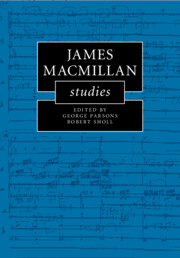Book contents
- James MacMillan Studies
- James MacMillan Studies
- Copyright page
- Contents
- Music Examples
- Tables
- Contributors
- Foreword
- Acknowledgements
- Introduction
- 1 The Struggle with Conviction: A Trio of String Quartets
- 2 Conflicting Modernities and a Modernity of Conflict in James MacMillan’s The World’s Ransoming
- 3 In Memoriam: James MacMillan’s Violin Concerto as Modernist Lament
- 4 Reincarnating The Tryst: The Endurance of a Simple Love Song
- 5 Exquisite Violence: Imagery, Embodiment and Transformation in MacMillan
- 6 Making the Familiar Unfamiliar: MacMillan’s St Luke Passion
- 7 MacMillan’s ‘Mission’ and the Passion Settings
- 8 A Cluster of Gathering Shadows: Exposition and Exegesis in Seven Last Words from the Cross
- 9 James MacMillan’s The Sun Danced: Mary, Miracle and Mysticism
- 10 ‘Shrouded in Doubts and Fears’: The Liturgical Music of James MacMillan
- 11 Containing Chaos? Aspects of Medieval Liturgy in James MacMillan’s Visitatio Sepulchri
- Bibliography
- Index
10 - ‘Shrouded in Doubts and Fears’: The Liturgical Music of James MacMillan
Published online by Cambridge University Press: 20 August 2020
- James MacMillan Studies
- James MacMillan Studies
- Copyright page
- Contents
- Music Examples
- Tables
- Contributors
- Foreword
- Acknowledgements
- Introduction
- 1 The Struggle with Conviction: A Trio of String Quartets
- 2 Conflicting Modernities and a Modernity of Conflict in James MacMillan’s The World’s Ransoming
- 3 In Memoriam: James MacMillan’s Violin Concerto as Modernist Lament
- 4 Reincarnating The Tryst: The Endurance of a Simple Love Song
- 5 Exquisite Violence: Imagery, Embodiment and Transformation in MacMillan
- 6 Making the Familiar Unfamiliar: MacMillan’s St Luke Passion
- 7 MacMillan’s ‘Mission’ and the Passion Settings
- 8 A Cluster of Gathering Shadows: Exposition and Exegesis in Seven Last Words from the Cross
- 9 James MacMillan’s The Sun Danced: Mary, Miracle and Mysticism
- 10 ‘Shrouded in Doubts and Fears’: The Liturgical Music of James MacMillan
- 11 Containing Chaos? Aspects of Medieval Liturgy in James MacMillan’s Visitatio Sepulchri
- Bibliography
- Index
Summary
It may seem slightly incongruous to look specifically at the liturgical music of James MacMillan, a composer for whom the liturgy has had such bearing on his entire compositional ethos and personal philosophy. For the liturgy has provided the impulse for both MacMillan’s large corpus of sacred choral pieces, and the bulk of his instrumental works. However, this over-riding influence of the liturgy makes an in-depth look at the purely liturgical works all the more relevant: here we find the composer stripped of the myriad of allusions that characterise other works and find him working in a specifically explicit manner. The chapter looks at MacMillan’s extant Mass settings, though will focus mainly on the setting from 2000 as the most succinct appraisal of his assimilating of the vernacular. It will also look at his Magnificat (1999), Nunc Dimittis (2000), Jubilate Deo (2009) and Te Deum settings, showing some of the composer’s current pre-occupations with the borrowing and recycling of material and ideas relating to form and through-composition.
Keywords
- Type
- Chapter
- Information
- James MacMillan Studies , pp. 183 - 199Publisher: Cambridge University PressPrint publication year: 2020

